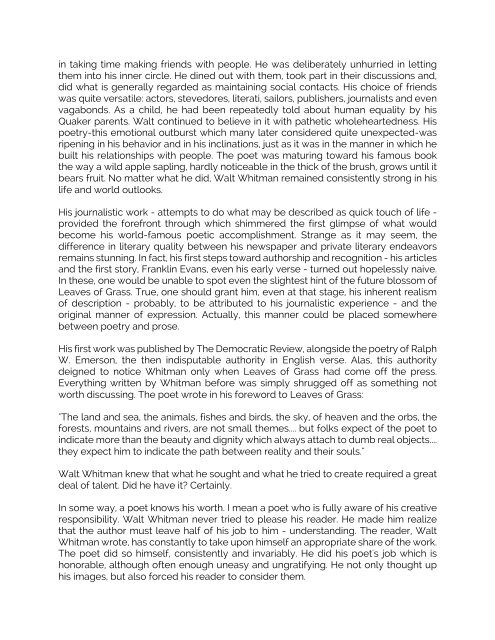PoetsGardenArrowParkNY_dl
Create successful ePaper yourself
Turn your PDF publications into a flip-book with our unique Google optimized e-Paper software.
in taking time making friends with people. He was deliberately unhurried in letting<br />
them into his inner circle. He dined out with them, took part in their discussions and,<br />
did what is generally regarded as maintaining social contacts. His choice of friends<br />
was quite versatile: actors, stevedores, literati, sailors, publishers, journalists and even<br />
vagabonds. As a child, he had been repeate<strong>dl</strong>y told about human equality by his<br />
Quaker parents. Walt continued to believe in it with pathetic wholeheartedness. His<br />
poetry-this emotional outburst which many later considered quite unexpected-was<br />
ripening in his behavior and in his inclinations, just as it was in the manner in which he<br />
built his relationships with people. The poet was maturing toward his famous book<br />
the way a wild apple sapling, har<strong>dl</strong>y noticeable in the thick of the brush, grows until it<br />
bears fruit. No matter what he did, Walt Whitman remained consistently strong in his<br />
life and world outlooks.<br />
His journalistic work - attempts to do what may be described as quick touch of life -<br />
provided the forefront through which shimmered the first glimpse of what would<br />
become his world-famous poetic accomplishment. Strange as it may seem, the<br />
difference in literary quality between his newspaper and private literary endeavors<br />
remains stunning. In fact, his first steps toward authorship and recognition - his articles<br />
and the first story, Franklin Evans, even his early verse - turned out hopelessly naive.<br />
In these, one would be unable to spot even the slightest hint of the future blossom of<br />
Leaves of Grass. True, one should grant him, even at that stage, his inherent realism<br />
of description - probably, to be attributed to his journalistic experience - and the<br />
original manner of expression. Actually, this manner could be placed somewhere<br />
between poetry and prose.<br />
His first work was published by The Democratic Review, alongside the poetry of Ralph<br />
W. Emerson, the then indisputable authority in English verse. Alas, this authority<br />
deigned to notice Whitman only when Leaves of Grass had come off the press.<br />
Everything written by Whitman before was simply shrugged off as something not<br />
worth discussing. The poet wrote in his foreword to Leaves of Grass:<br />
"The land and sea, the animals, fishes and birds, the sky, of heaven and the orbs, the<br />
forests, mountains and rivers, are not small themes.... but folks expect of the poet to<br />
indicate more than the beauty and dignity which always attach to dumb real objects....<br />
they expect him to indicate the path between reality and their souls."<br />
Walt Whitman knew that what he sought and what he tried to create required a great<br />
deal of talent. Did he have it? Certainly.<br />
In some way, a poet knows his worth. I mean a poet who is fully aware of his creative<br />
responsibility. Walt Whitman never tried to please his reader. He made him realize<br />
that the author must leave half of his job to him - understanding. The reader, Walt<br />
Whitman wrote, has constantly to take upon himself an appropriate share of the work.<br />
The poet did so himself, consistently and invariably. He did his poet's job which is<br />
honorable, although often enough uneasy and ungratifying. He not only thought up<br />
his images, but also forced his reader to consider them.


